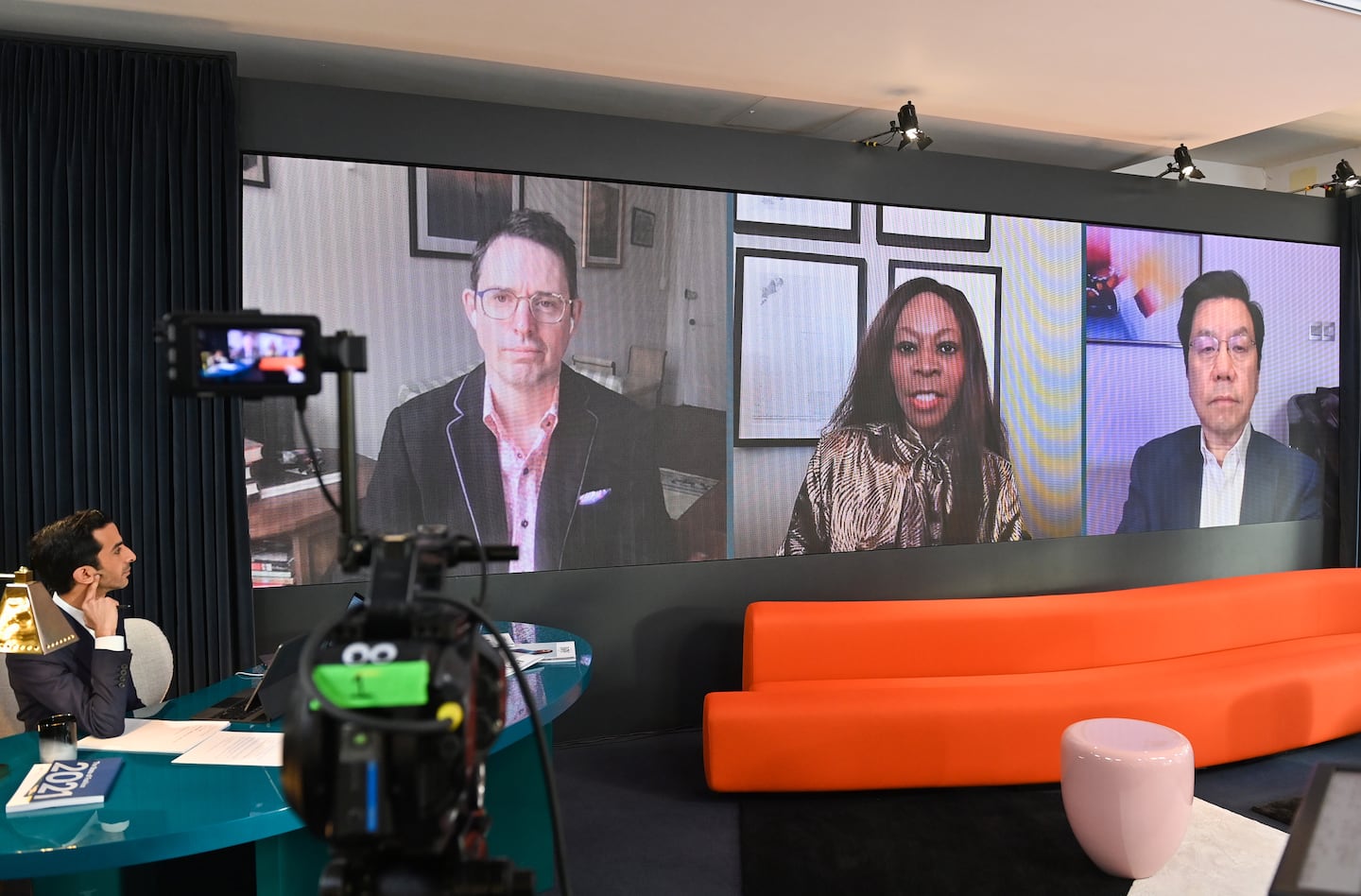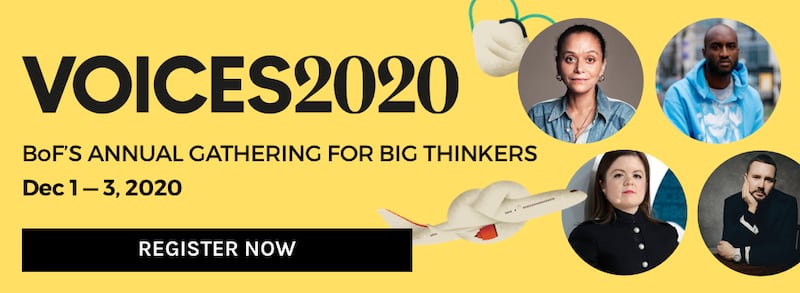
The Business of Fashion
Agenda-setting intelligence, analysis and advice for the global fashion community.

Agenda-setting intelligence, analysis and advice for the global fashion community.

 Opens in new window
Opens in new windowFashion – along with the rest of the world – has had a rough 2020. At VOICES, BoF’s annual gathering for big thinkers, this year held digitally, speakers didn’t sugarcoat the scale of the challenges facing the industry, the global economy and the wider world.
Dambisa Moyo, an economist and author, compared the demand shock brought on by Covid-19, rising debt levels and the contraction in global trade to conditions in 1929 at the onset of the Great Depression. Venture capitalist Roger McNamee blamed Facebook, Amazon and other tech giants for a “cascading series of catastrophes going from the online world into the real world.” UK Member of Parliament David Lammy noted how rising inequality and a shrinking safety net left disadvantaged communities particularly vulnerable to the pandemic.
For fashion, these global concerns hit close to home. The trade war between the US and China had disrupted the apparel supply chain even before sales nosedived during the spring lockdowns. Brands are struggling to convince customers to return to stores, and face an uncertain future online where Facebook, Amazon and Google dominate the advertising market. This summer’s protests against racial injustice and police brutality exposed deep inequalities along racial and gender lines, forcing brands to reckon with their own lapses.
And yet, many who spoke at VOICES on Monday saw opportunity in the current crises to take action against big tech monopolies, to fight systemic racism and to fundamentally rethink what makes us happy and how we define the “good life” to which we aspire.
ADVERTISEMENT
“If you look at the last decade or two, you find lots and lots of growth, the Dow Jones shooting past 30,000, historically low unemployment, yet we see wellbeing stagnating,” said Jan-Emmanuel De Neve, Professor of Economics & Director, Wellbeing Research Centre, University of Oxford. “We need to think differently. Covid is an opportunity for us to transition to a world where we put wellbeing and mental health much more centre stage.”
Below are some highlights from the first day of Voices, distilled down for BoF Professionals:
The Era of De-Globalisation
In her comparison to 1929, Moyo addressed the shift toward “de-globalisation,” highlighting how the world’s major economies are ratcheting up barriers to trade and immigration. One of her fellow panelists, Axios financial journalist Felix Salmon, described a “balkanisation” of the world economy after decades of closer ties, with nations and companies forced to choose between aligning themselves with China or the US. Covid-19 has only accelerated this trend, as China’s economy quickly bounced back, Salmon said, even as “the rest of the world is kind of imploding.”
He speculated that if globalisation is to make a return, it may involve Chinese innovations making their way to the global market rather than Western companies entering China – think TikTok’s trajectory, on a grand scale. Despite painting a bleak picture, Moyo said she was “optimistic in many respects,” particularly about technology’s ability to revolutionise education and healthcare. Sinovation Ventures CEO Kai-Fu Lee, a third panelist, said China and America can’t reach their full potential in isolation. “If we only look to China … [it’s like] going to school to study and only looking at the odd pages,” he said.
Learning From the Spanish Flu
In her talk, science journalist Laura Spinney looked to the last global pandemic for inspiration: the “Spanish Flu” of 1918. Then as now, social distancing was the primary means of preventing infection, and many countries struggled to contain the disease. There are some key differences, however. In 1918, there was no vaccine and the flu killed anywhere from 50 million to 100 million people. Covid-19 has killed at least 1.5 million people, but a number of vaccines may be just months away from global distribution.
Spinney also noted that the 1918 pandemic forced the world to unite to confront a global problem, a collaborative spirit that over the next few decades led to the creation of the World Health Organisation and other important international bodies. She said she hopes Covid-19 “revives the idea that we need a global response to a global crisis.”
ADVERTISEMENT
Tackling the Big Tech Threat
There’s little doubt the pandemic has been a boon for technology giants. But McNamee sees destructive behaviour by the world’s biggest tech firms driving the current crisis moment, whether it’s misinformation on Facebook swinging elections or Amazon reshaping entire industries and eliminating competitors, with its mastery of data and influence over consumer behaviour. He called on governments to treat tech giants as dangerous monopolies which should be held liable for the damage they cause and ultimately broken up.
Fashion, he said, has a role to play. “The fashion industry has a superpower,” he said. “You’re actually connected to culture, so people care what you have to say. You have to recognise as an industry that these guys are changing the rules and you have to fight back.”
The first step — and a matter of self-preservation — is connecting directly to consumers, rather than relying on social media, Amazon and Google, which dominates online advertising. “You cannot constantly concede to internet companies the primary access to your audience,” he said. “Until the industry creates its own ways of communicating, it’s going to have a problem.”
Fighting Inequality: From Race to Food Justice
Christina Adane, an activist and youth board member on Bite Back 2030, which seeks food justice, saw a more benign role for social media. In April, she started an online petition in her bedroom calling for an extension to the UK’s free school meals programme. Word quickly spread, and the petition received over 430,000 signatures, attracting the attention of Manchester United football player Marcus Rashford, who has since persuaded the UK government to extend free school meals to children from low-income families during school holidays. “Social media can really connect people and get people to fight for something,” Adane said.
Rashad Robinson, president of Color of Change, a civil rights advocacy group, described how social media helped galvanise mass movements to fight racial injustice this summer, adding that it’s how a technology is harnessed that is key. “Just like telephone or TV or any other technology used and leveraged in service of activism, it can also be used in service of keeping people down,” he said.
Robinson called on the fashion industry to focus less on “fixing” Black people, and to instead examine the system that keeps them from being hired or advancing their careers. “When we talk about vulnerable communities, we spend our time trying to fix those people,” he said. “When we talk about systems and structures, we spend our time trying to fix those systems and those structures.”
ADVERTISEMENT
Beyond GDP: Rethinking Human Happiness
De Neves co-edits the World Happiness Report, an annual effort to measure global wellbeing. The report’s annual survey asks people in over 150 countries about how satisfied they are with their lives. And though poorer countries tend to see happiness rise as they develop economically, richer countries see diminishing returns from GDP growth.
In business, he said executives should prioritise their employee’s happiness along with conventional KPIs. “Happiness and wellbeing are socially contagious,” he said. “If you do well for your workers, you will do well for their families. If there’s one thing companies can do it’s focusing on job satisfaction.”
The first day of Voices ended with a call to radically rethink society on every level, from the scholar Carlota Perez. She said fashion needs to get away from planned obsolescence and the constant drive to convince consumers to buy more stuff. That means consumers must rethink the concept of ownership as well – what objects they need to own to enjoy comfortable lives, as opposed to renting or doing without. “We have to change our lifestyles and our aspirations completely,” she said. “Pleasure doesn’t necessarily come from having lots of things.”
VOICES 2020 is made possible in part through our partners McKinsey & Company, Affirm, SCAD and Invisible Collection.
From analysis of the global fashion and beauty industries to career and personal advice, BoF’s founder and CEO, Imran Amed, will be answering your questions on Sunday, February 18, 2024 during London Fashion Week.
The State of Fashion 2024 breaks down the 10 themes that will define the industry in the year ahead.
Imran Amed reviews the most important fashion stories of the year and shares his predictions on what this means for the industry in 2024.
After three days of inspiring talks, guests closed out BoF’s gathering for big thinkers with a black tie gala followed by an intimate performance from Rita Ora — guest starring Billy Porter.